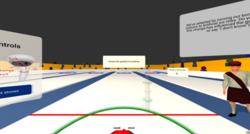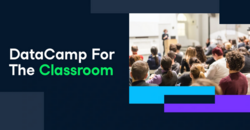Laufende Abschlussarbeiten
Evaluating Immersive VR and Generative AI Based Learning Environments for Scottish Culture Heritage

Virtual Reality (VR) and Generative Artificial Intelligence (AI) are two innovative technologies with the potential to transform educational practices. VR can create immersive learning environments, enabling students to experience different cultures and historical periods firsthand. AI can personalize learning experiences by providing students with tailored content and feedback. This bachelor thesis explores the potential of combining VR and generative AI to enhance the teaching and preservation of Scottish cultural heritage. Central to this study is the development of a prototype VR experience Scottish Curling VR, which focused on Scottish Bonspiel, an outdoor curling tournament held on a frozen lake. The thesis was showcased at the Festival der Zukunft, where participants were observed and asked to complete a survey. These observations resulted in improvements to the prototype and valuable insights into the public perception of VR and AI in educational settings. This research suggests combining VR and generative AI can create immersive and personalized learning environments. It also reveals a positive public perception toward employing these technologies in educational frameworks. Nevertheless, certain limitations persist. Notably, generative AI models occasionally introduce inaccuracies or misinformation, demanding either expert supervision or a discerning user. Despite these limitations, the research presented in the thesis suggests that VR and AI can potentially improve educational learning experiences. Future research should focus on the quantifiable improvements in learning outcomes achieved through combining VR and generative AI in educational settings.
Effects of Gamification on Learners' Motivation and Engagement in Digital Learning Experiences

Gamification” is the use of game design elements in non-game contexts.
This bachelor thesis focuses on the effects of gamification on motivation and engagement in digital learning. A three-phase user study is included. The study will recruit 40 participants divided into two groups: one using a gamified platform (Datacamp) to learn Python, and the other using a non-gamified medium.
This study is supported by DataCamp, the most intuitive learning platform for data science and analytics. Learn any time, anywhere and become an expert in R, Python, SQL, and more. DataCamp’s learn-by-doing methodology combines short expert videos and hands-on-the-keyboard exercises to help learners retain knowledge. DataCamp offers 350+ courses by expert instructors on topics such as importing data, data visualization, and machine learning. They’re constantly expanding their curriculum to keep up with the latest technology trends and to provide the best learning experience for all skill levels. Join over 6 million learners around the world and close your skills gap. Find out more here: datacamp.com/groups/education.